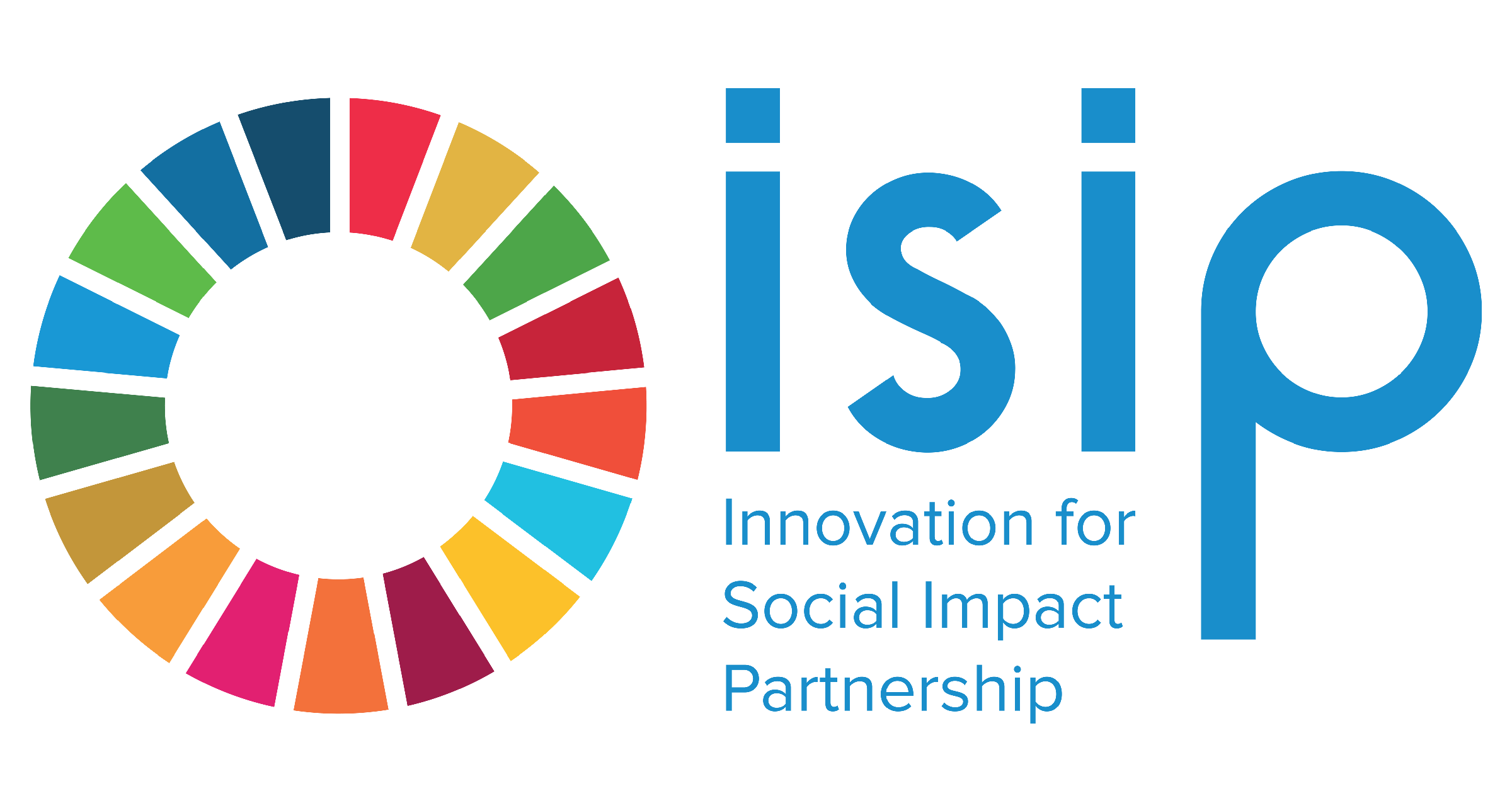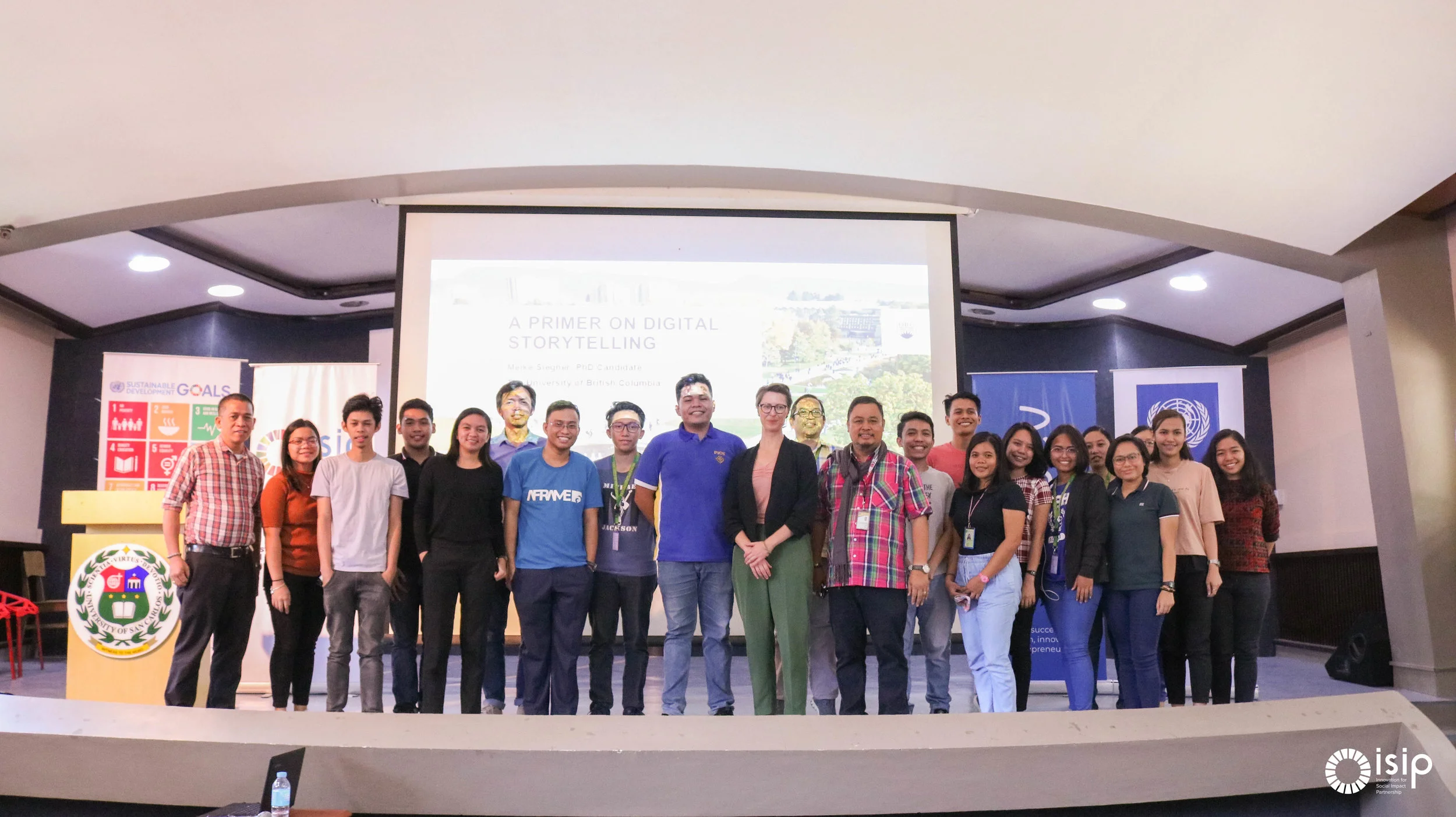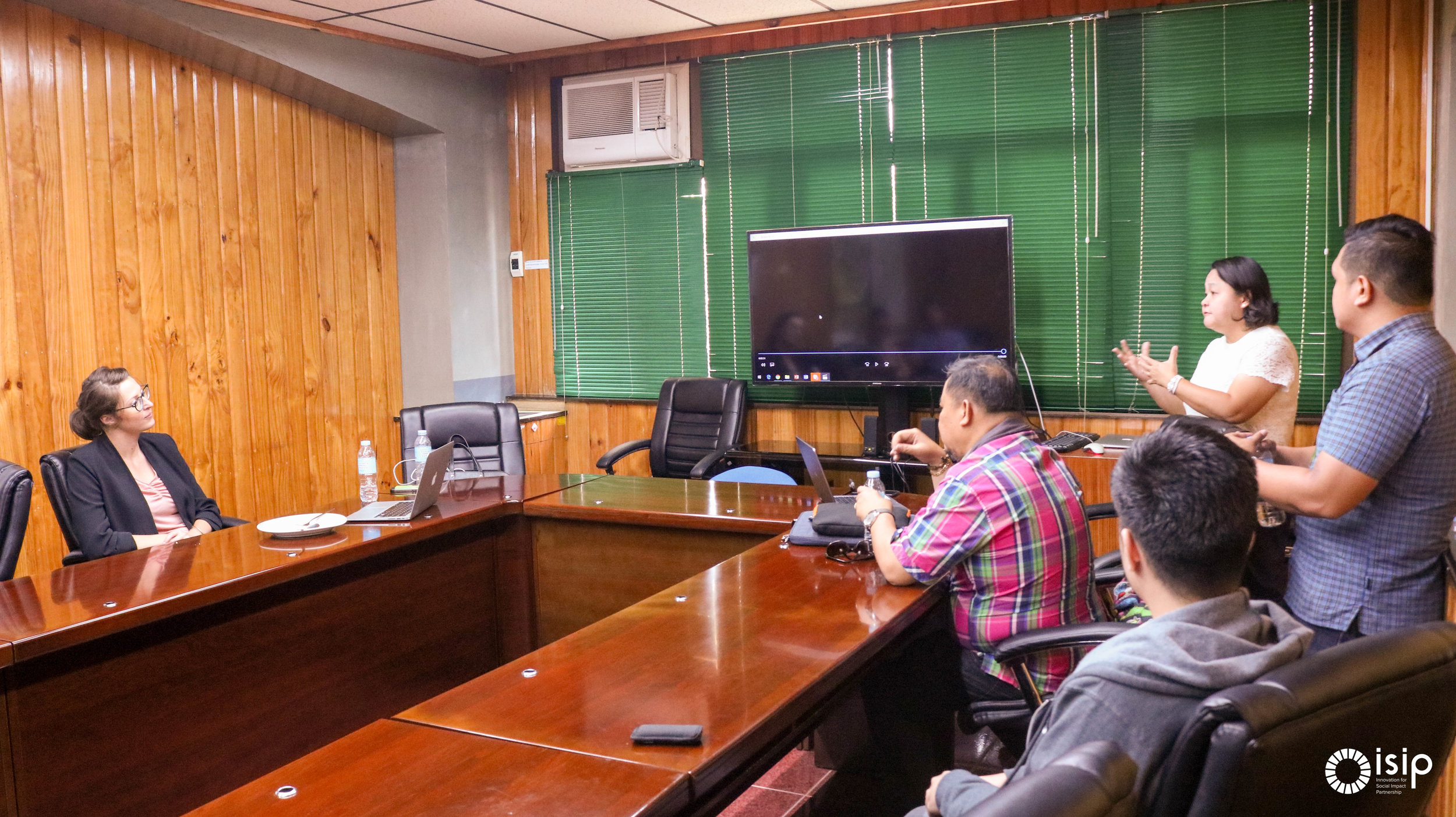Achieving the Sustainable Development Goals through Globally Connected Networks
Part 1 of ISIP’s Visiting Professor Feature
by Marielle Bordado
“It is an opportunity to build connections and long-term relationships. In the end, when it comes to solving social and environmental issues, sustainability, and working towards the sustainable development goals, [it] is ultimately about human connection and building relationships, getting to understand the local context and the specific problems and opportunities.”
Meike Siegner is a PHD Candidate in Sustainable Business Management from the University of British Columbia. She came to the Philippines in August 2019 for her five-day deployment as Visiting Professor under the Innovation for Social Impact Partnership (ISIP) project.
Meike is one of the professors deployed to Philippine universities this year to share their knowledge, experience and expertise in Social Entrepreneurship Education, Social Enterprise Mentorship, and Technology Business Incubator Operations. She was deployed at the University of San Carlos (USC) in Cebu City where she conducted lectures, workshops and mentoring sessions to administrators, faculty members, social entrepreneurs, and students of the university. Meike focused on topics related to Sustainability, Social Entrepreneurship, and Digital Storytelling.
Originally from Berlin, Germany and now serving as a lecturer based in Vancouver, Canada, this is Meike’s first time to travel to Southeast Asia. “I thought it would be a wonderful opportunity to go to a continent that I have not yet visited extensively and to learn about the local entrepreneurial culture and academic ventures, geared towards fostering social venture and social entrepreneurship,” shares Meike.
Australian Innovation Program Showcase
Part of Meike’s engagement as a Visiting Professor was at the Australian Innovation Program showcase where she delivered a keynote presentation on the topic of Social Enterprises As Drivers for Social and Environmental Sustainability. The event was hosted by the Australian Embassy in the Philippines where program partners, staff members of the Australian Embassy, and Alumni of the Australian Leadership Awards from various sectors including the government, private sector, development organizations, and the local social entrepreneurship community attended.
Meike shares her experience interacting with Filipino social entrepreneurs “I’ve met with a bunch of very talented, bright, young people over the past days and they’ve been saying ‘we are seeing our problems, whether in terms of waste management or poverty or finding technological applications to infrastructure problems and issues.’ They are very aware that these problems can be built into opportunities”
In Cebu, Meike also met with Australian Awards alumna Anya Lim who is the Co-Founder and Managing Director of Alternative Nest and Trading/Training Hub for Indigenous/Ingenious Little Livelihood seekers (ANTHILL), a social enterprise which aims to preserve and promote Philippine hand-loomed fabrics through a sustainable ecosystem model of community enterprise development.
People have a lot of misconceptions about social enterprises, so they need to be educated. Just because you’re working with a community doesn’t make you a social enterprise,” said Anya.
Anya also highlighted the importance of continuous support to sustain social enterprises in the Philippines. “There’s so much support for startups but not a lot for us who are sustaining the business–we call ourselves the ‘keep-going’” she added.
Introducing the Circular Economy Model
During her deployment at the University of San Carlos (USC) in Cebu City, Meike conducted lectures and discussions focused on linking social enterprises with environmental sustainability and how this creates added value to social enterprises. She also emphasized on the role of social enterprises in the circular economy.
“I think what the social ventures, students, and academics here will find useful is the connections and international exposure to learn about what has been applied elsewhere, such as the circular economy, for example, which has been a debate to be promoted at a policy level, for example in the European Union, US, and Canada. Then think about what can be taken from that experience of having a policy-based entrenched approach to circular economy, and what can be applied on the ground in the Philippines. It is an invitation for local actors to think about how we can make it work here, what is useful for us and what might we want to do differently” explains Meike.
Dr. Evelyn Taboada, Dean of the USC College of Engineering, shares their experience during knowledge sharing sessions with theVisiting Professor. “Meike is very proficient and an expert in circular economy and social entrepreneurship. She is very keen on defining circular economy and emphasizing its importance for sustainable enterprises and enterprises with social impact,” said Dr. Taboada.
USC’s TechHub Manager, Dr. Angelo Cabije is pleased to learn about additional knowledge and best practices about circular economy as USC is already utilizing such approach in their university programs.. “We have good examples here like the GEMS (Green Environmental Management System) program, which creates useful by-products like polyphenols, flour, and briquettes from waste materials from mango fruits—from the peel, seeds, and husk. We help the community by providing employment opportunities through the program” said Dr. Cabije.
Meike also conducted mentorship sessions to the innovators who are currently part of USC TechHub’s incubator program. One of the founders present during the mentorship session is Francis Dave Shakur of Verdant Valley. Francis was heavily involved in the research on converting mango waste into useful products. This inspired him to do more research which impacts the community and create his own startup.
Francis raised issues they encounter in their business, particularly in terms of managing the business along with a full-time job. “It was really insightful because we were able to realize some things that we didn’t realize when we were initially conceptualizing Verdant Valley. She gave us pointers on what to do, what to expect, and what to focus on” he said.
Part of the selection process for Visiting Professors participating in the program is a mechanism that allows for partner Philippine universities to choose which field or topics they deem are most valuable to their University, based on their needs. USC’s vision is to become a Teaching, Research and Entrepreneurial University (TREU) by 2030, and this has been their guide in determining which topics they would find most useful to help them realize that vision.
Dr. Taboada is grateful for the opportunity given to universities to choose their Visiting Professor based on their needs. “We are always keen and interested in looking at how the Visiting Professors program can contribute to our long-term goals and objectives,” she emphasized.
Dr. Cabije also adds that their VP’s expertise will add value to the work they are doing in their TechHub. “Meike is more specific on social entrepreneurship and she imparted a lot of things. At the end of the day, we’re going to count on what society has gained from all these things that we are doing under Technopreneurship. I think more of the social enterprise sustainability and circular economy is being infused here [in USC] and that is Meike’s important role, as an advocate and mentor,” said Dr. Cabije.
Telling the Social Impact Story
Aside from topics on sustainability management, Meike also facilitated a Digital Storytelling Workshop for students and faculty members of USC. Meike heads the Organizational History and Digital Storytelling project for enhanced social impact in the Community Alternatives Co-op, an initiative for sustainable urban living in Vancouver.
Meike shared during the workshop that effective stories should be told through the eyes and voice of the beneficiaries. Furthermore, telling stories effectively help organizations get to know better their beneficiaries and in turn provide a higher sense of belongingness and pride amongst beneficiaries, resulting in higher measurable social impact. Meike also introduced three types of anchors that they can use in storytelling––person, place and struggle.
Ana Patricia Loren, Founder and General Manager of a social enterprise that distributes organic products directly sourced from the farmers in Mindanao shares her experience participating in the workshop, “I find this session very helpful because right now we have a struggle in terms of branding, we had a legal issue with our old brand, so it’s a springboard on how we can tell our story again with our new brand. The most helpful part for me was the [use of] person as an anchor in storytelling because that’s what we have been doing and I see that it is very effective. It is one of the things that we will continue using,” said Patricia.
Ways Forward
One of the objectives of the Visiting Professors activity is to forge and establish partnerships among Philippine and international universities, even beyond the duration of the deployment and the project. Dr. Taboada and Visiting Professor Meike Siegner have already discussed potential points of collaboration between USC and Meike’s team from the University of British Columbia’s School of Business Management.
“We also take care of the network built to make sure that the collaboration would continue beyond the program’” shares Dr. Taboada.
Dr. Taboada and her team identified possible ways forward to strengthen USC’s TechHub and improve the teaching of the Technopreneurship 101 subject. Meike has also reinforced these observations and looks forward to working further with USC “We recognized aspects for improving our TechHub and improving our programs. We decided to explore possibilities where we could work together on various case studies and various examples and success stories that we can develop, write, and publish so this could serve as examples, especially to other universities here in the Philippines. Here in the country, we really need success stories and failure stories—stories we can learn from. And these stories would be real stories and contextualized in the Filipino environment and our own situation so that we can draw inspiration, learning and insights from these stories, “I think that as an academic institution, it is our responsibility to document, publish, and promote these stories for everyone,” explains Dr. Taboada.
“I think that as an academic institution, it is our responsibility to document, publish, and promote these stories for everyone,” explains Dr. Taboada.
Meike further shares that the knowledge exchange from this activity can definitely be integrated into her teaching: “Having the cultural exposure and having a deeper understanding on how startup ecosystems are working somewhere else in a very different cultural context will help me integrate these into my teaching. It will be a wonderful opportunity to talk about case-based approaches from another place in the world that is very different from Canada, in terms of on-the-ground challenges and social and environmental problems. I think it will be an excellent opportunity to sensitize students and entrepreneurs in Canada to the variety of entrepreneurship ecosystems that exist and local solutions to address pressing problems,” said Meike.
Asked about the value that the Visiting Professors activity brings to building the social entrepreneurship ecosystem, Meike emphasizes the importance of global connected networks, “To me, connecting academics, connecting universities is really a big part of that and I found the opportunity provided by ISIP was a wonderful opportunity to make use of that global connection of enhancing the opportunity for social entrepreneurship.”
“To me, connecting academics, connecting universities is really a big part of that and I found the opportunity provided by ISIP was a wonderful opportunity to make use of that global connection of enhancing the opportunity for social entrepreneurship. ”
--
The Visiting Professors is one of the activities of the Innovation for Social Impact Partnership (ISIP), a project co-implemented by UNDP in the Philippines and PhilDev Foundation, with generous support from Australia in The Philippines.










